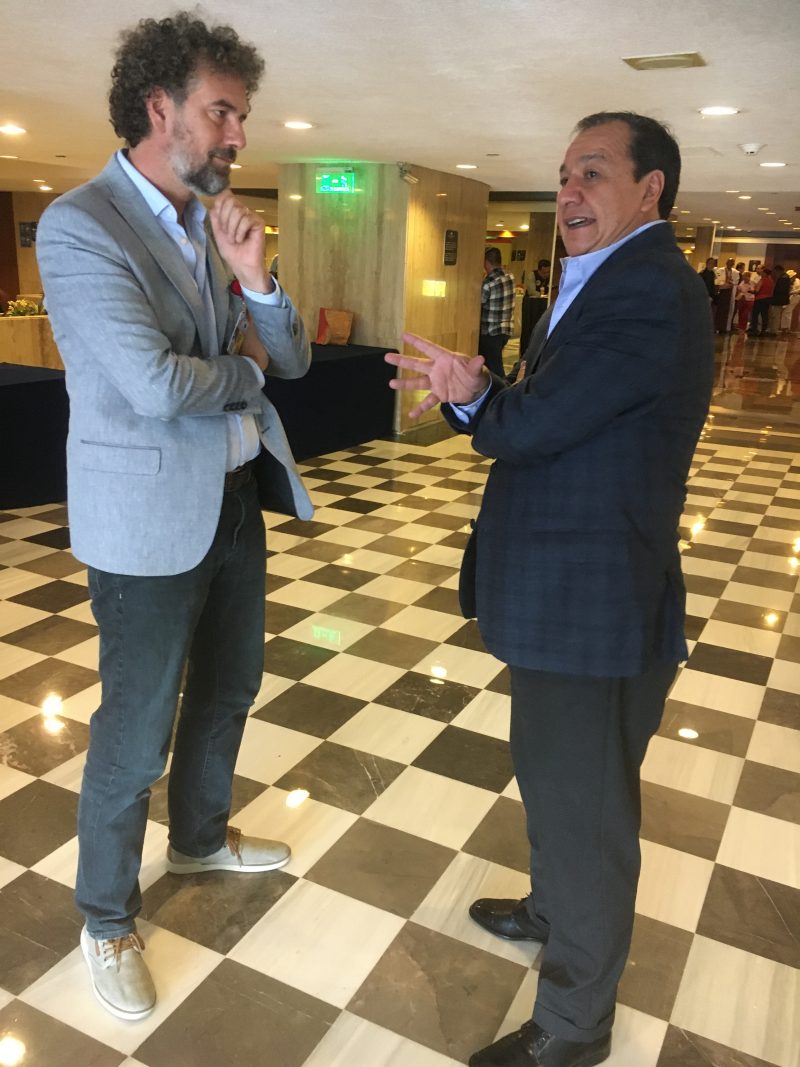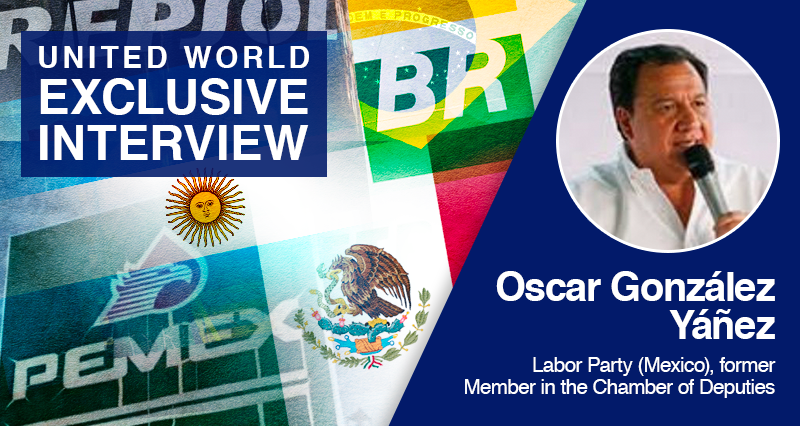The United States continues trying to exclude Russia from international oil markets and determining the oil price, while maintaining the oil supply. Despite Washington’s attempts to organize increasing supply, OPEC has recently decided to cut production by 2 million barrels per day.
In that context, another challenging proposal comes from Mexico: to coordinate price policies on Mexico’s, Venezuela’s and Brazil’s state-owned oil companies vis a vis Washington.
We spoke to the owner of the proposal, Oscar González Yáñez. Yáñez is a former Federal Deputy in the Lower Chamber of the Mexican parliament and co-founder of the Labor Party, where he is currently in the National Coordination – the leading organ of the party.
The Labor Party is the minority partner in Mexico’s governing coalition together with MORENA (Movement for National Regeneration). We spoke to Yanez in Mexico City.
What is the background of your proposal?
The current debts of our countries have turned into chains that stop us from progressing in our development. This debt is constraining all governments. Comes a capitalist party to power – needs to pay the debt. Gets a leftist party to power, it needs to pay. It is as if we have car in our countries, we are good drivers, get in the driver seat and want to drive – but can’t move because there is no gas in the tank. Under the conditions of current debt service, any form of leftist or national development policy is made impossible.
The current debt plunders the national wealth, and progressive governments find no way to satisfy with policies the expectations they have created and which carried them to power.
“Balance of power in Latin America is in our favor”
What I am proposing is: the current balance of power in Latin America in our favor, with the leftist and progressive governments dominating, permits us to challenge the global oligarchy in better conditions. I am not proposing not to pay the debt, because it is not our aim to destroy the global financial order. What I am proposing is a renegotiation, because the global financial order cannot continue on the expense of the populations of Latin America.
Latin America has the second biggest debt after the United States, competing in that matter with the People’s Republic of China. This forces the global financial architecture to revise relations with Latin America.

Here, some instruments we have are the following: the balance of power in our favor, our unity and the creation of a Latin American Bank of Development.
But what will help us in the objective, that they sit down and think over the current debt, are own natural resources.
With the oil of Mexico, with that of Venezuela and the reserves of Brazil together, we are the fourth biggest producers worldwide. We are the leading producer of lithium and also number one in the production of gas.
These resources help us to reconstitute our relations with international financial organizations.
But, for instance in the case of oil, there is already the OPEC.
Yes, but can establish a kind of Latin American OPEC. We have the greatest oil reserves in Venezuela, a good producer, which is Brazil, and with the production of Mexico added, we can achieve an oil production of 8 to 9 million barrels a day. This will take undoubtedly some time and investment, but would change at the end the world.
But what is the purpose here? The idea is not even to increase the price endlessly. What we need is an equilibrium price. This price changes from country to country, according to conditions of production. For instance in Mexico, that price is 67 dollars per barrel. This is the price that convenes to Mexico to sell and buy petroleum and its products. A higher price is not necessarily of advantage for us, because we profit when we sell, but we loose when we buy according products.
You are then proposing cooperation between PEMEX from Mexico, PdVSA from Venezuela and Petrobras from Brazil in consideration of sales and price policies?
Yes, we should have coordinated policies. And we should use the advantages of the free trade agreement between Mexico and the United States. I don’t say this will be easy, but step by step, you can on that way achieve good prices and better income for the countries of Latin America.
On that way, we can also satisfy the needs in our continent. For instance Cuba needs oil, but does not produce itself. Then we organize an agreement between Brazil and Cuba, where oil is exchanged for sugar cane.
“This cooperation might lead to a common Latin American currency”
What we need is to start discussing these aspects of regional cooperation. And if this project is successful, it can even lead to the introduction of a common currency in Latin America that establishes itself as an alternative to the Dollar and the Euro.
Besides, regional cooperation offers advantages that we miss. I will provide you an example: 4 years ago, I made a proposal to the Minister of Economy of Venezuela and the Minister of Finance here in Mexico. I suggested that PdVSA should sell the refineries it has in the United States to Mexico. The Mexican Minister of Finance responded to me ‘We don’t have the money’ and I answered: ‘They will give them to you for free’. Why? Because the United States was going to expropriate Venezuela. But as Mexico has the free trade agreement with the United States, Washington could not have expropriated us.
Did not work out, the US expropriated the refineries and 1900 gas stations on top, which PdVSA had owned there. That incident opened my eyes. Venezuela has the capacity of producing 3 million barrels a day, but due to the US blockade, they only produce approximately 700.000.
But they seem to have also domestic problems in increasing the production?
If we join forces of Mexico and Venezuela, the United States cannot place an embargo on Venezuela anymore due to the free trade agreement we have with the United States. The agreement sometimes is an opportunity and sometimes an obstacle. What I am proposing is that the governments of our countries sit down at a table and discuss – in details – how we can cooperate.
“Rarely in history we had so many comrades in government in Latin America”
How do you see the chance to realize the proposal?
Discussions have already started and I think that within 2 or 3 months, we can get the project started with participation of the according representatives from the governments of Mexico, Venezuela and Brazil.
It is a historic situation. Very rarely in history we had so many comrades in government in Latin America. You also have Peru, Colombia and Bolivia. We will see how the President of Chile, Boric reacts to the idea. You have Argentina, Cuba would take part, one will have to consider Nicaragua…
And sector of priority is energy. Why do we need to stay isolated each? So in summary, the idea is first to agree on a joint price mechanism for oil exports, and secondly, renegotiating debts and debt services.
If the United States feels threatened, it will sit down to negotiate.
Currently, Washington increases interest rates, causing further problems for indebted countries.
Definitely. The crucial thing is that we negotiate the debt all together. As José Marti said: “I know the entrances of the monster, and therefore, I know I can defeat it.”
We have to try the impossible; otherwise, we have no future. Mexico alone pays yearly 180 billion pesos (approximately 9 billion dollars) of debt – the same amount that we needed to invest for our recently constructed oil refineries.
If you do not touch on that problem, for what purpose you want to get to government?

















Leave a Reply